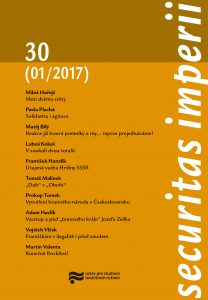Mezi dvěma světy. Proměny národnostní identity rodiny Czernin Morzinů v 1. polovině 20. století
Between two worlds. Changes in the national identity of the Czernin-Morzin family in the latter half of the 20th century
Author(s): Miloš HořejšSubject(s): Politics and society, Interwar Period (1920 - 1939), Fascism, Nazism and WW II, Politics and Identity
Published by: Ústav pro studium totalitních režimů
Keywords: Czernin-Morzin; 20th century; German occupation;aristocracy;Czechoslovakia;
Summary/Abstract: The case study looks into the national identity of the last generation of the Czernin-Morzin family, which, like many other noble families settled in the Czech lands, was nationally indifferent and shared strong cosmopolitan views. The turn of the 1920s and 1930s and the subsequent German occupation in particular meant a turning point for the family. A nationally indifferent approach was no longer tolerated, in particular in major land owners. The Czernin-Morzin family can serve as a certain example of changes in identification and affiliation to a particular nationality made under pressure of political events and economic influence. Rudolf Hermann Czernin-Morzin was a big country patriot, who found it difficult to reconcile with the establishment of the Czechoslovak Republic; in particular his nostalgic “Altösterreicher” views were bolstered by the measures and consequences of the first land reform. He passed his beliefs down to his son Jaromír, who soon also acquired his own negative experience with the land reform and the effects of taxation of land, movable and immovable assets. Jaromír’s opulent lifestyle contributed significantly to the collapse of the family enterprise in the 1920s and in particular in the 1930s. Thanks to his family links and friendly contacts he was close to the political circles surrounding Austria’s Chancellor Kurt von Schuschnigg. Other noble families living in Czechoslovakia shared similar “pro-Austrian” views and refused to modify their views even after the Anschluss of Austria. Jaromír’s contacts with the Nazi occupation organs cannot easily be labelled as collaboration. His restored marriage to a Jewish “half-caste” and his arrest by the Gestapo put his opportunism in a different light. Consequently, with the current state of knowledge, Jaromír Czernin-Morzin can be ranked among opponents of the national socialist regime from among the nobility, who, however, did not have favourable opinions of the first Czechoslovak state for different reasons but at the same time did not contribute politically to its breakup in the late 1930s.
Journal: Securitas imperii
- Issue Year: 2017
- Issue No: 30
- Page Range: 12-35
- Page Count: 24
- Language: Polish

